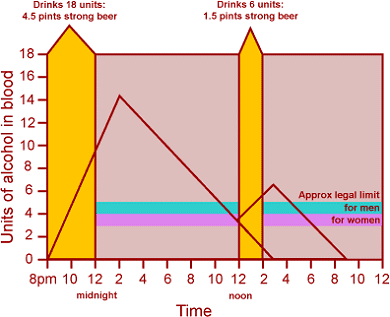A step-by-step guide to alcohol
What do you think? Does alcohol only affect your brain, or does it affect the whole of your body?
Most of the effects of alcohol are registered in the brain, such as the feeling of being drunk or having slurred speech. But alcohol consumption affects every part of the body when it's absorbed into the bloodstream - here's a step-by-step guide to how it happens and how much it really is safe to drink.
How does my body absorb alcohol?
Alcohol passes quickly from your mouth into your stomach and small intestine, where it is absorbed into the bloodstream. It's then circulated through your liver and on to your heart, lungs and brain. The faster you absorb the alcohol, the higher your blood alcohol level will be, and the more alcohol in your blood, the greater its effect will be. Absorption is more rapid if you:
- drink quickly
- add a fizzy mixer
- drink on an empty stomach
- are small, young or female
Your body is cleansed of all alcohol by your liver as the blood flows through. This is a slow process. Alcohol is eliminated from the body at about one unit (10ml) of alcohol per hour. So, the alcohol in one pint of ordinary strength lager will take two hours to pass out of your body. If you drink a lot in the evening you may still be over the limit in the morning. And, drinks at lunchtime could have a top-up effect, and again, could make you over the limit.

Time taken for an average 11 stone (70kg) man who has just eaten to process the alcohol in his body. The graph will vary for individuals of different sex and weight. Body processes one unit per hour.
How much is it safe to drink?
The upper limit for "low risk drinking" recommended by UK medical bodies is up to three units per day for men, and up to two units per day for women. Obviously the advice is not to consume a week's limit in one or two nights!
Women have a lower limit than men mainly because women's bodies tend to be smaller, and have more fat and less water. This means that the alcohol is less diluted and stays in the body for longer.
Drinking levels and driving
The UK driving limit is 80mg of alcohol per 100ml of blood - which is roughly equivalent to two pints of regular strength lager. This is however, only a guide. You should never drink up to the limit just because you can. Studies show that driving skills are affected after just one unit, which means that your risk of having an accident is higher even if you are below the legal limit.
Drinking levels and pregnancy
To avoid damage by alcohol to the baby, pregnant women should abstain or drink no more than one unit very occasionally, because everything a pregnant woman drinks is passed to the foetus. Alcohol has also been associated with a higher risk of miscarriage and fertility problems.
|
Why not find out what more BUPA can do for you?
For more information about discounted BUPA private medical insurance for members of approved fitness centres, please call BUPA today on 0800 600 500 and quote A711.
|

Latest health and fitness news
 All news stories
All news stories
Latest quizzes and tests
 All quizzes &
tests
All quizzes &
tests
|

